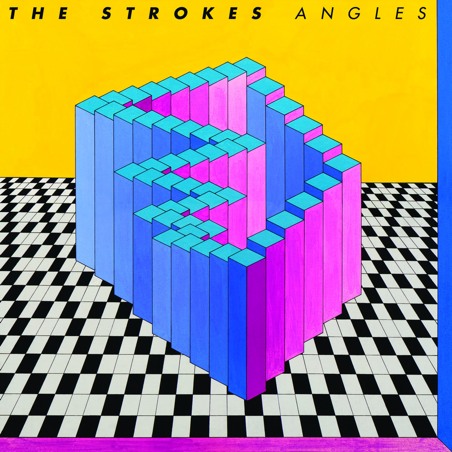Julian Casablancas has always been the most powerful force driving The Strokes forward. This is no slight against the other band members — it’s simply his vision that has dictated their sound most clearly. But after an unfairly maligned third record, they were left with nothing to say as a band for five long years. Within this space of time, almost every single Stroke put out a solo record, and rumors surfaced that the band was done for good, with Casablancas repeatedly expressing little public interest in reuniting any time soon.
Once the group finally began work on a fourth album, prospects were still looking dim: scrapped sessions with a former producer and a year-and-a-half gestation period with little news. And then came word that the band was trying something new, with each member contributing the same amount to the creation process; working — for perhaps the first time in their history — as equals. And their sound, the very thing that placed them at the center of attention at the start of the last decade? Oh, that would change, too: a 2011 write-up in NME described tracks as being influenced by “80s new wave, specifically The Cars.”
So the big question seems to be: are The Strokes back? Have they finally recaptured the pop culture zeitgeist of Is This It? Has working as a single unit brought them back from the edge? And, perhaps most importantly, will Angles do for new wave what Is This It did for garage rock revival?
Well, the good news is that The Strokes have delivered a good album. The bad news is that for all its throwback production, it doesn’t really sound much like The Strokes, and many of their longtime fans are probably going to be disappointed in an album that doesn’t retreat to the sound of the band’s glory days with its tail between its legs. Of course, it may seem redundant to mention that the band has changed its sound and then cite that as a criticism, but at times — as with their last album — the band places style over substance. Experimentation is one thing; sacrificing melodies in pursuit of this is another.
The album opens solidly with the cheeky “Machu Picchu.” “I’m putting your patience to the test,” teases Casablancas over a Graceland-style percussion; a self-deprecating nod to the long wait for new material. Lead single “Under Cover of Darkness” comes next, and it’s a ridiculously catchy song — probably the one here that sounds most like old-school Strokes — with Casablancas even throwing in a reference to “Last Nite” for good measure.
But the album isn’t entirely consistent — “You’re So Right,” one of the record’s more experimental tracks, is also one of its worst; the band’s attempt at dressing up as Radiohead falls a bit flat. “Taken for a Fool” has its production in the right place but suffers from a rather weak hook. “Games” isn’t much better; Casablancas’ voice wailing violently over the outro is a high point, but the song doesn’t really go anywhere. The following track, “Call Me Back” is, by contrast, quite nice — a ballad with hushed vocals in the chorus and staccato guitar-work that slowly builds in cadence. And “Gratisfaction” is as awesome as its title might imply: a gleefully relaxed and poppy tune in the vein of “Someday” or “Barely Legal.”
“Metabolism” sounds like a cut from First Impressions, bearing a resemblance to that album’s “Electricityscape.” The chorus features Casablancas in full-on croon-mode, the oft-unintelligible lyrics failing to detract from the desperation in his voice. “I wanna be somebody like you,” he mumbles at one point, before a burst of guitars drown his voice out. The Strokes are often at their best when bemoaning their hedonistic lifestyle and this track is no exception.
Angles closes with the melancholy “Life is Simple in the Moonlight,” with Casablancas informing a former fling that he’s jealous and alone, trying to forget the love they never had. It’s an interesting paradox: if there were never any feelings, why can’t he get the relationship out of his head? It’s this curiously apathetic outlook on decidedly emotional experiences that made songs like “Last Nite” so compelling a decade ago. The Strokes might have changed their sound, but when it comes to anger and regret, they’ve still got something to say.
Though some songs do wander and suffer from being self-indulgent, The Strokes have taken a step back in the right direction with this record, from the tightened rhythm section right down to the ten-track, 40-minute runtime. In a newly-published career retrospective on Pitchfork, the band criticized the recording process of Angles, and said they feel their next album might be better. That’s probably true enough — Angles was self-produced by the group in Albert Hammond, Jr.’s studio, which, quite frankly, was a poor decision; and Casablancas’ method of recording his vocals apart from the band results in a noticeable disconnect — but this is still an admirable effort.

